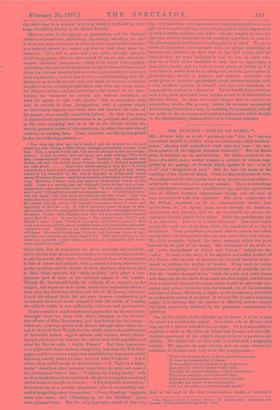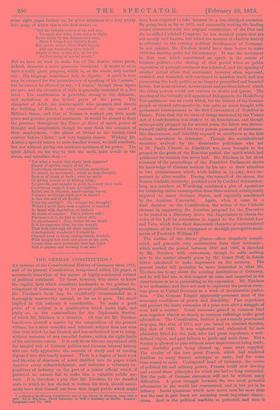MR. AUSTIN'S "TOWER OF BABEL."*
ME. AUSTIN tells ua in his "prefatory note" that he "has not concerned himself to eschew what are commonly called anachro- nisms," alleging with undoubted truth that they were " the uni- form practice of the highest dramatic authority." But his whole poem is founded on an anachronism. He finds a subject in the loves of a spirit and a mortal woman, a subject, of course, sug- gested by the passage of Genesis which speaks of the "sons of God" and "daughters of men." But he lays his scene at the building of the Tower of Babel. From an historical point of view, the confusion of the two epochs may seem to have no importance ; artistically considered, it is a great mistake. There is something dim and shadowy about the antediluvian age, and the mysterious hint of alliance between supernatural beings and the race of man accords well with this character. The great catastrophe of the Deluge separates, as by an immeasurable chasm, that epoch from us ; its figures loom to us through the darkness, mysterious and gigantic, and we are contented to accept the strangest legends about their origin. With the postdiluvian age it is otherwise. This is in a sense historical. The races which people the earth are those from which the mankind of to-day is descended. Their genealogies are ours, and we cannot find place among them for progenitors who are not more than half human. We fully recognise, indeed, the inner meaning which the poet intends by the plot of his drama. His dedication of his work to
all "pure descendants of Afrael and Noema" enlightens the reader. Woman is the slave of the impious and selfish builder of the Tower, who dreams of securing for himself limitless enjoy-
ments by scaling the heights of heaven. From such an union there can but spring a race of brutal tyrants or of cowardly slaves. But she "mates on equal terms" with the pure and noble being who descends on the earth from some ethereal height, and informs with a spiritual element the union which would be otherwise cor- poreal and gross ; while he wins for himself, out of his initiation into sacred human affections, a higher grade of existence, and finds in incarnation a step of progress. If we read Mr. Austin's meaning aright, it is obvious that its essence is affected, and we cannot but think injuriously affected, by the particular anachronism in question.
One of the results of the mistake, as we count it to be, is that the poem has a ludicrous aspect. Incredulus odi, as Horace said long ago of a marvel intruded on our sight. So it is impossible to suppress a smile at the loves of Afrael and Noema, nor does Mr.
Austin's treatment of his subject always help us to preserve our gravity. The spirit falls in love with a mortal with a laughable celerity. He appears on page twelve, and on page sixteen he addresses to Noema some very lover-like compliments :—
" What will become, then, of those cheeks that seem
To wear an immortality of bloom, Those golden tresses steeped in gloriolfs noon, And eyes for which I travel vainly back Through the scoured Spheres to find comparison : That brow seraphic, those cherubic lips, That gently-penetrating voice which sounds Like the last ripple of the nightingale, Just ere the silence groweth smooth again."
And at the end of the first conversation, which is concluded
• The Tower of Babel : a Poetical Drama. By Alfred Austin. Edinburgh anti London William Blackwood and Sons. 1874.
some eight pages further on, he gives utterance to a very pretty love song, of which this is the first stanza :—
"Mid the infinite spaces of air and sky, Through the mons, from morn to night,
Borne along by the firmament's song, Have I winged my Spirit's flight.
But never, never, since flight began, Did my wandering eyes behold Aught so fair, in the sky, in the air, As this being of mortal mould."
But we have no wish to make fun of Mr. Austin, whose poem, indeed, deserves a more generous treatment. It seems to us to have a really great purpose, which is, on the whole, ably carried out. His language sometimes fails in dignity. A spirit in love may be excused for the inconsistency of speaking of his " senses-," but he cannot be allowed to say, " I wager," though these lapses are rare, and the elevation of style is generally sustained to a due level. The versification is powerful, strong in the dramatic, and melodious in the lyrical parts of the poem. The character of Arad, the master-spirit who prompts and directs the building of Babel, is ably conceived on the model of Milton's Satan, and that of Noema is worked out with much grace and genuine poetical sentiment. It would be absurd to deny the presence throughout the Tower of Babel of much power of thought and imagination, though we may think the occasion of their employment, " the plains of Shinar in the twenty-third century before Christ," not very happily chosen. Wishing Mr. Austin a speedy return to more familiar scenes, we shall conclude, but not without giving our readers a specimen of his power. The spirit Afrael, on his way to visit the earth, halts awhile in the moon, and moralises thus :— "Yet what a wreck this skyey bark appears!
Empty of spirits, empty of all life, Pastureless, streamless, voiceless, tenantless.
No sound, no movement; silent as deep thought, Bare or of trunk or herb; even no noise Of falling waters or of flitting wing; No growth, and nought to grow in,—only bare rock.
Cavernous, rugged, huge, precipitous, Rolled out in slippery, unadvancing waves, Volcanic writhings rigid now in death!
Is this the end of all fidelity Unto the earthly ? Oh! avant the thought !
Withal I ne'er have seen a sphere so scarred, So faced with desolation, so extinct, So shorn of comfort. Yet it follows still I Perchance it is its fate to follow still, Its punishment ! Nay, rather let me think It is its supreme bliss, its one reward, That doth outweigh all other penalties.
0 melancholy wanderer! I would be Charred even as thou, extinguished, desolate, With nought but rock and ashes at my core, Sooner than once surrender that last right Still to pursue and worship from afar !"



































 Previous page
Previous page